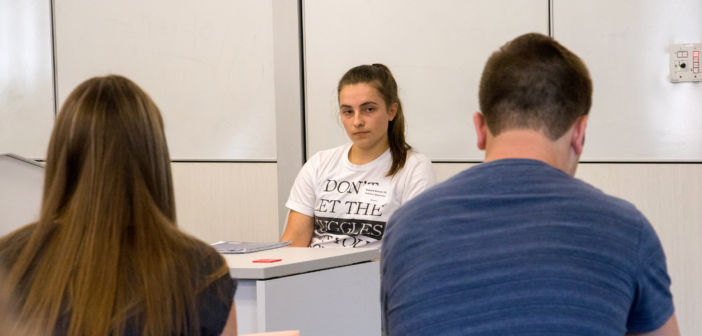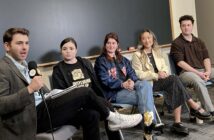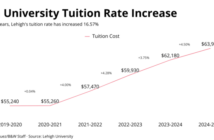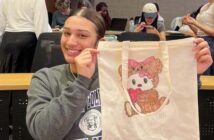The room is divided — five students sit on each side, and jury members cling to the perimeter. The prosecution is on the right, the defense on the left.
“Do you swear to tell the truth, the whole truth and nothing but the truth?” the bailiff asks.
In the course Sociology 313: Social Movements, Ziad Munson, an associate professor of sociology, teaches students about significant movements in history by assigning character roles and holding trials Mondays and Wednesdays at 2:35 p.m. Jason Slipp, a senior instructional technology consultant, also helps teach the class.
Slipp said the students in the course are reenacting the trial of the Montgomery Bus Boycott in Alabama. The mock trial is dubbed a “Reacting to the Past” game.
Munson said he prefers using games like this one to teach his students because they are simulations of the real world and allow students to discuss cause and effect rather than just take notes.
“Instead of telling the students you need to know X, Y and Z, I tell them what their goal is and they have to figure out what they need to learn to accomplish X, Y and Z,” Munson said. “I have not told them what sources to use, they have to figure it out on their own.”
Cristiana Villani, ’19, who played Judge Eugene Carter, slammed the gavel and announced that court was in session.
Kirsten Hernandez, ‘19, playing the role of defense attorney Fred D. Gray, began questioning her witness, NaVette Smith, ’19, who played trade unionist E. D. Nixon.
The 30-minute trial saw three objections and one five-minute recess before it adjourned for the day. The prosecution requested a recess before questioning the defense’s witness. Once granted, the team exited the glass room on Fairchild-Martindale Library’s second floor and discussed the trial at a nearby table.
Students take the class seriously, researching the trial for hours before each meeting to prepare for any curveballs the opposition could throw.
“I’m doing the research because I want to win the case, and I’m invested in it, so I’m actually learning about it,” Hernandez said.
She said looking deeper in the Montgomery Bus Boycott case has been a fascinating experience and the extent of everyone’s research goes far beyond the surface level knowledge they had prior to the course.
Nana Amankwah, ’18, who played city commissioner Clyde Sellers, agrees.
“I like the role playing, dressing up in somebody else’s shoes,” Amankwah said. “I’m actually getting an in-depth understanding of the history behind what we’re role playing.”
Slipp said the “Reacting to the Past” games like the mock trial in Sociology 313 are trending, and teachers at several universities are designing or improving their own games for their classes. This is the first time this specific game has been played at Lehigh, and while Munson and Slipp didn’t create the original game, they both hope to continue the practice in upcoming years.
“I want students to look back 15 years from now and say, ‘Oh yeah, I did learn something in that class,’” Slipp said.
Munson said the trial was three weeks long, or six classes in total. Closing statements took place Sept. 27. For the remainder of the semester, the students will debrief the game and continue learning about historical social movements.
Munson said his favorite part of this experience has been watching his students get better each day and become more familiar with their characters, learning about the insides of the case and even teaching the professors.
“I’ve always thought about going to law school, but I wasn’t certain, and doing this (trial) has reaffirmed that that’s something I definitely want to do,” Hernandez said.
While the work is demanding and time-consuming, the students in Sociology 313 recognize the extent of what they’re learning from this teaching style.
“These are people who are all experts at doing something — taking tests, studying for exams, writing papers — and we’re asking them to do something they’re not very good at and that is very decentering and stressful,” Munson said. “But, some of that’s a good thing, to force students to be outside of their comfort zone and take responsibility for their own learning.”






Comment policy
Comments posted to The Brown and White website are reviewed by a moderator before being approved. Incendiary speech or harassing language, including comments targeted at individuals, may be deemed unacceptable and not published. Spam and other soliciting will also be declined.
The Brown and White also reserves the right to not publish entirely anonymous comments.
1 Comment
Pingback: Sociology students recreate civil rights trial